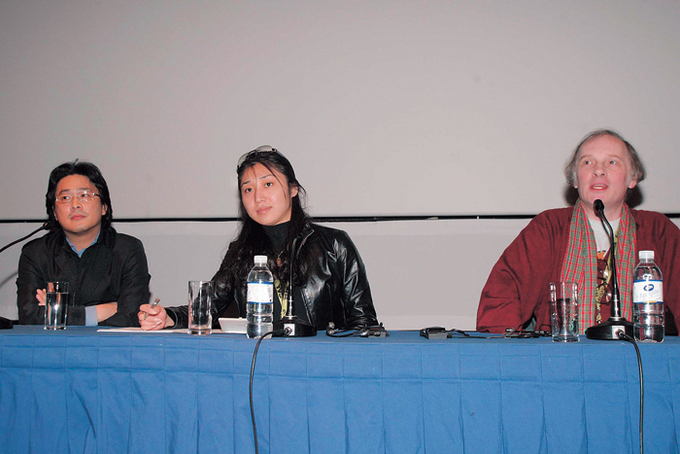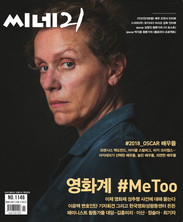 박찬욱 감독의 마스터클래스. 데릭 엘리(사진 오른쪽)가 진행을 맡았다.
박찬욱 감독의 마스터클래스. 데릭 엘리(사진 오른쪽)가 진행을 맡았다.
영화제를 45년 만에 개혁하는 일은 어떻게 해야 하나? 바로 이 문제가 올해 그리스의 가장 오래된 행사이자 유럽 연중 스케줄에서 마지막 중요한 영화제인 데살로니키국제영화제 새 집행위원장 데스피나 무자키가 직면한 것이었다.
무척 호감이 가는 40대 후반의 정력 넘치는 여성인 무자키는 1989년 시네그램이라는 제작사를 세웠고, 국제 공동제작뿐만 아니라 <터치 오브 스파이스>(A Touch of Spice)나 <브라이즈>(Brides) 같은 상업적 성공을 거둔 양질의 영화를 제작하면서 수많은 자회사들을 통해 자국 업계에서 강력한 힘을 발휘하게 됐다. 90년대 후반 그녀는 2002년 그리스 제작자협회의 회장으로 가기 전까지 국가지원기관인 그리스영화센터의 부회장으로 있었다.
2004년 봄, 그리스 정권은 좌파에서 우파로의 교체가 있었고, 13년 동안 영화제를 이끌었던 데살로니키 집행위원장 미셸 데모플로스는 거의 1년 뒤쯤 해임됐다. 그는 영화제를 국내 행사에서 국제 행사로 변모시켰고, 첫 작품과 두 번째 작품 감독들을 위한 경쟁부문을 1992년부터 영화제에 포함시키기도 했다. 데살로니키영화제의 조직위원장인 그리스 베테랑 감독 테오 앙겔로풀로스는 그의 해임에 이의를 제기하며 사임했다. 몇달 동안 진정과 항의, 그리고 언론의 교전으로 영화제는 혼란의 도가니가 되었다.
퍽 익숙한, 무수하게 일어나는 일이다. 영화제들이 부분적으로 정부지원에 의존하는 한, 일부 나라들에서는 늘 정치적 임용과 해임이 행해질 것이다. 그러나 앙겔로풀로스의 게릴라 활동에도 불구하고 제46회 데살로니키국제영화제(11월18∼27일)는 흥행 면에서 봤을 때 커다란 성공을 거뒀고(관객이 6% 증가해 약 8만명 기록), 상영과 토론회 모두 꽉 찼고, 데살로니키의 관객은 막후의 정치적 술수보다는 영화제의 작품과 초청객들 기준으로 영화제를 평가하는 듯했다.
무자키 위원장은 그리스에서 두 번째로 큰, 6만 학생인구가 있는 도시의 최신 유행의 젊은 느낌을 반영하는 프로그래밍으로 영화제에 활기를 다시 불어넣고 싶다고 말했다. 그리고 그렇게 해냈다. 국내 마케팅과 홍보가 향상됐고, 240여편의 영화로 꽉 찬 프로그램에는 멕시코, 덴마크, 아일랜드영화 섹션이 포함됐으며, 영국 감독 마이클 윈터보텀, 프랑스 감독 파트리스 셰로, 그리고 이탈리아 촬영감독 비토리오 스토라로 등이 모두 참석한 가운데 이들의 특별전이 열렸다. 심지어 미국 감독 프랜시스 포드 코폴라 감독도 그의 영화계 가족과 함께 명예상을 받기 위해 참가했다.
무자키 위원장은 또한 데모플로스 위원장 아래에서는 유럽 중심이었던 영화제에 동아시아영화를 훨씬 많이 진입시켰다. 대만 감독 허우샤오시엔은 회고전과 마스터클래스를 위해, 김지운 감독은 장편 네편의 전작 상영을 위해, 박찬욱 감독은 ‘복수’ 3부작 상영과 마스터클래스를 위해 영화제에 참석했다.
박 감독의 마스터클래스는 (그리스 태생이었던 고 미국 감독 존 카사베츠를 기리는) 카사베츠 극장에서 열렸으며, 도시의 강렬한 영화활력을 반영했다. 상영관은 대다수가 영화과 학생인 300명의 사람들로 꽉 찼다. 이들에게 박 감독은 스타였고(<올드보이>는 DVD로 출시돼 이미 컬트영화가 됐다), 나중에 그는 참을성 있게 사인을 해줬다. 그의 3부작 또한 김 감독의 네편의 장편과 마찬가지로 대만원인 채 열광적인 관객에게 상영되었다.
그러나 무자키 위원장은 미래의 더 큰 도전에 직면해 있다. 국제영화제라면 평가의 기준이 되는 ‘쇼윈도’ 역할의 경쟁부문에 활기를 불어넣기 위해 프리미어를 끌어올 수 있어야 하는 일. 쉽지만은 않은 일이다. 연말이면 제작자과 세일즈사들은 다음해 1월과 2월에 있는 높은 관심을 끄는 영화제들, 특히 선댄스, 로테르담, 그리고 무엇보다도 베를린영화제를 위해 영화들을 묶어둔다. 결국 핵심은 요즘의 영화제들이 전적으로 사업과 관련돼 있다는 것인데, 부산영화제와는 달리 데살로니키는 국제 업계와 언론을 끌어들일 수 있는 부가적인 미끼로 활기찬 지역 사업을 지니지 못하고 있다. 무자키 위원장은 힘찬 출발을 이뤄냈지만, 다음 단계는 그렇게 쉽지만은 않아 보인다.
How do you go about reinventing a festival after 45 years? Such was the problem faced this year by Despina Mouzaki, new head of the Thessaloniki Intl. Film Festival (TIFF), Greece's oldest event and the last significant one in the annual European calendar.
An energetic, very likable woman in her late 40s, Mouzaki founded the production company Cinegram in 1989 and has steered it, through its many affiliates, to become a powerful force in the local industry, producing quality commercial hits like "A Touch of Spice" and "Brides," as well as co-producing internationally. During the late '90s, she was vice-head of the state-funded Greek Film Centre, leaving to head the Greek Producers' Organisation in 2002.
Greece switched from a left-wing to right-wing government in spring 2004, and TIFF's director, Michel Demopoulos, was fired almost a year later, after heading the festival for 13 years. He had transformed it from a local event into an international one, including a competition for first and second-time directors, started in 1992. TIFF's president, veteran Greek director Theo Angelopoulos, resigned in protest; chaos reigned for a few months, with petitions, protests and press warfare.
So much, so familiar. As long as festivals rely partly on government funding sources, political hiring and firing will always be the case in some countries. However, despite Angelopoulos' guerrilla activity, the 46th TIFF (18-27 Nov.) was a major success in box-office terms (admissions up by 6% to some 80,000 tickets), screenings and discussions were packed, and Thessaloniki's audiences seemed to judge the festival more by its films and guests than by backstage political machinations.
Mouzaki said she wanted to reinvigorate the festival, with programming that reflected the hip, youthful feel of the city, Greece's second largest and with a student population of 60,000. She certainly did that. Local marketing and publicity was improved, and the bulging programme of some 240 films included sections on Mexican, Danish and Irish cinema, plus tributes to British director Michael Winterbottom, French director Patrice Chereau and Italian d.p. Vittorio Storaro, all of whom attended. Even U.S. director Francis Ford Coppola, with his filmmaking family, came for an honorary award.
Mouzaki also brought East Asia much more into the festival's orbit, which under Demopoulos had been largely western-centred. Taiwanese director Hou Hsiao-hsien came for a retrospective and masterclass; Kim Jee-woon, too, for showings of all his four features; and Park Chan-wook for screenings of his "vengeance" trilogy and a masterclass.
Park's masterclass, held in the Cassavetes Theatre (named after the late U.S. director John Cassavetes, who was of Greek origin), reflected the city's strong film vibe. The venue was packed with some 300 people, largely film students, for whom Park (whose "Old Boy" was already a cult movie on DVD) was a star, afterwards patiently signing autographs. His trilogy also played to full, enthusiastic houses, as did all of Kim's four features.
But Mouzaki faces a broader challenge for the future: she needs to attract premieres to enliven her Competition, the "shop window" by which all international festivals are judged. That's not so easy. By the end of the year, producers and sales agents keep back films for high-profile festivals in January and February, notably Sundance, Rotterdam and especially Berlin. The bottom line is that festivals nowadays are all about business and, unlike Pusan, TIFF does not have a "hot" local industry that can act as an extra draw for international industryites and press. Mouzaki has made a strong start; the next stage may not be so easy.

